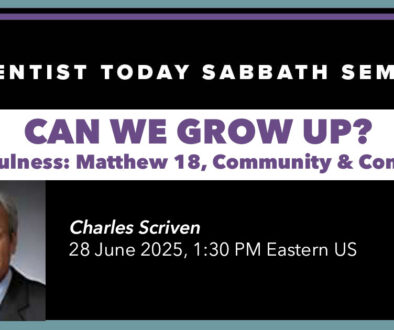Innovative Worship: How to be an AT Profile Church
Intro by Debbonnaire Kovacs, worship tips by Nicholas Zork, May 4, 2017
Several years ago, I was privileged to attend the Music and Worship Conference at Andrews University. I reported on it to this magazine. Lately, I’ve been profiling churches whose names come to me as “safe places”—and isn’t that a sad thing, that we have to identify churches where God’s broken and hurting children will feel safe and welcomed? Sometimes in journalism, you have a half a dozen leads out, and nothing is coming back in time for deadlines. This is the second week in a row for me.
In the Nick of time (sorry, couldn’t resist J) I found this wonderful article by Nicholas Zork, whom I met at that worship conference I attended, and with whom I immediately connected. Nick Zork and I share a longing for worship that pulls in and feeds our whole selves—worship the way it was experienced in the Old Testament, as nothing but an acted out redemption play, and as it was in the New Testament, when it was eagerly perusing letters from good friends, digging out more and more exciting details about this astonishing story of Jesus.
If you’ve been reading church profiles and wish your church was more like theirs, here are two concise, practical, usable tips from Nick. The second one, in my opinion, is a real zinger. Try them—see what happens! DLK
The Holy “Otherness” of Christian Worship
By Nicholas Zork
While visiting a Nigerian congregation in Los Angeles, I experienced a congregational song I knew well, but it was sung in a manner I’d never seen. “Holy Is the Lord God Almighty,” the worshippers sang as they danced in a moving line up to the front of the worship space and past a single offering plate, where each participant exuberantly placed their gifts. I’d heard God’s holiness proclaimed through many styles of music, but I’d never seen it celebrated with such festive abandon.
The adjective, “holy,” suggests that something or someone is set apart, different, “other.” To recognize God’s holiness is to affirm that, in an essential way, God is not like us. God is omnipotent, omniscient and unfailing in love. Even at our best, we only imperfectly and incompletely reflect the God in whose image we’re made. This imperfection and incompleteness is part of why we need one another and our differing expressions of worship. Only when we experience a diversity of incomplete reflections can we begin to gain a three-dimensional vision of God. For this reason, we can best encounter a holy God — the divine “Other” — in diverse community, worshipping alongside those who are in some way “other” to us.
Here are two suggestions for how we can maximize the holy potential of diversity in worship:
First, design the service in such a way that participants can respond differently to the same revelations about God. The Nigerian worshippers I encountered in Los Angeles would likely share my basic definition of God’s holiness. But it became apparent to me that morning that God’s holiness had a different and particular significance for their lives in that moment. I’d grown up in worship cultures that catered largely to those who identified with the dominant power structures in the United States. The power dynamics in worship reflected the power dynamics of the broader society and the preferences of those who enjoyed positions of privilege in it. In such worship, the notion of a holy God — a ruler unlike human authorities — is unsettling. This holy God may well overturn the hierarchies in which we are presently comfortable. It’s little wonder that I’d learned to associate singing “holy, holy, holy” with fear and trembling. In the worship cultures of those who do not enjoy positions of privilege, like many members of this immigrant church, a different response to a holy God is understandable. A holy, divine ruler in whose Kingdom “the last will be first” would be welcome news indeed.
Diverse expressions of worship can be not only equally valid but mutually edifying. When planning your worship service over the coming weeks, try asking members of your community with very different life experiences to offer brief reflections on the same passage of Scripture. You could also ask different musicians in your congregation to write new music for the same hymn text. The resulting varied responses will serve as poignant reminders of God’s willingness and ability to meets us in the midst of our particular circumstances. It’s humbling to realize how incomplete our own perspective is. But it’s even more encouraging to recognize how complete and inclusive the redemptive work of a holy God can be.
Second, try to plan one unfamiliar or even uncomfortable element of worship for every gathering. I recognize that this is pretty counterintuitive advice. Participation, of course, requires some familiarity. But if nothing in a service challenges us to think beyond our narrow experiences and preferences, we are undercutting our preparedness to recognize and encounter a holy God. Teach a congregational song from a culture that may not even be represented in your congregation. You could also invite members of your congregation for whom English is not their first language to offer brief public prayers in their mother tongue without translation. Such practices will allow worshippers to experience true hospitality. When worship practices are overly familiar, worshippers do not experience the generosity of crossing barriers or the welcome of a space in which the majority is willing to be uncomfortable for the sake of a neighbor. All healthy relationships require sacrifice. And sadly, in diverse communities, this sacrifice is rarely shared equitably. But we have the opportunity to challenge this norm as we worship a holy God — a God who is not like us, a God who willingly sacrificed and unjustly suffered in order to restore a relationship with humankind. Our hospitality toward one another will help us more deeply appreciate God’s hospitality toward us. Our experience of our neighbor’s holy “otherness” will enrich our understanding of the divine “Other” we worship. And our encounter with this holy God will transform our human relationships. Perhaps we will all start singing “Holy is the Lord God Almighty” like the truly wonderful news it is.




